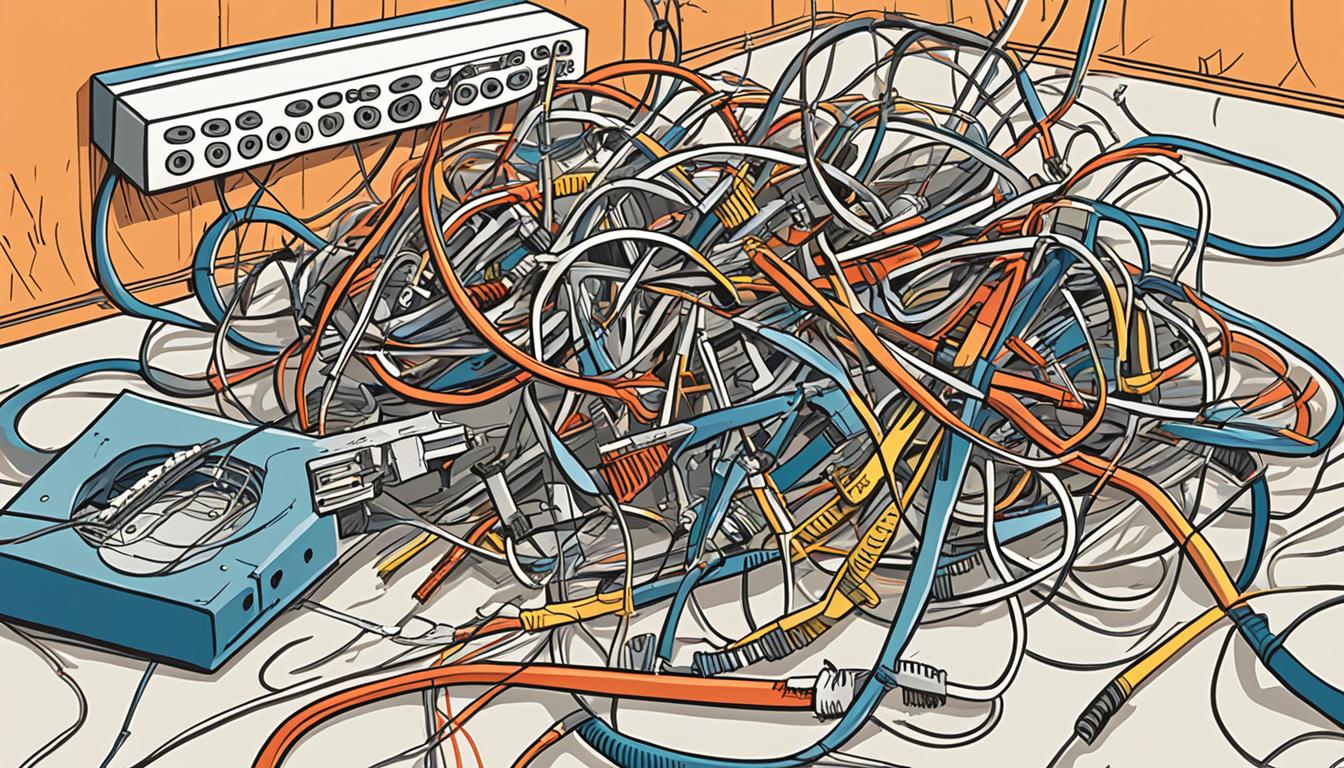We all make mistakes. Sometimes we wish we could go back and choose differently. Some mistakes are small and easy to fix. Others can change our lives in big ways. This article talks about big personal mistakes and how to stay away from them. By understanding these errors, you can face life better and have a happier future.
You’re at a crossroads, choosing between a safe path and an unknown one. You pick the unknown, hoping for better chances. Yet, as you go, you see it was a wrong choice. The path is hard, and you face many obstacles. You start to doubt your decision.
Taking risks can sometimes help us grow. But, it’s important to think carefully before making a choice. A big mistake is not looking at the good and bad sides of a decision. It’s easy to get excited by a new chance without thinking of the risks.
This article will look at big mistakes people make and how to avoid them. We will talk about money errors, not focusing on personal growth, and more. The goal is to learn from errors, make smart choices, and take steps for a better future.
Key Takeaways:
- Avoid fast decisions and think about the good and bad sides.
- Learn from mistakes and choose wisely to not repeat them.
- Work on personal growth and taking positive steps for the future.
- Plan your spending, keep track of money, and stay away from debt you don’t need.
- Look after your body and mind with exercise, healthy food, and self-care.
Financial Missteps: Overspending and Debt
Many people often spend too much and build up debt. A study by Bankrate found that 28% of Americans have more credit card debt than they do emergency savings. This issue can cause a lot of stress and stop you from reaching your dreams.
To steer clear of overspending and debt, it’s vital to actively manage your finances. Making a budget helps you keep track of what you earn and spend. This way, you can see where you might be using too much money. By figuring out what’s most important and limiting extra spending, you can take control of your finances.
Also, try to avoid buying things on a whim. Impulse buys can add to your debt and mess with your financial health. Instead of just buying something immediately, think about if you really need it and if it fits your financial plans. This careful thinking can help you make better choices and keep debt away.
Making financial mistakes can affect you for a long time. Being careful and making smart choices can help you keep a good financial balance. This way, you can work towards a future without debt.
Creating a Budget: A Step-by-Step Guide
Following these steps can help you manage your finances better and avoid spending too much:
- Assess Your Income and Expenses: Figure out what you make each month and keep an eye on your spending to understand where your money goes.
- Set Financial Goals: Think about what you want to achieve soon and in the future, like saving for an emergency or paying off what you owe.
- Categorize Your Expenses: Organize what you spend into different types, such as housing, travel, food, fun, and debt repayments.
- Create a Budget Template: Make a plan using a spreadsheet or an app to outline your earnings, spending, and how much goes to each type.
- Allot Funds to Categories: Split your income among the different types of spending, making sure each gets a fair and manageable share.
- Track Your Expenses: Keep an eye on your spending and change your budget as needed to stay on course.
- Review and Revise: Look over your budget now and then to see how close you are to your financial goals and adjust if needed.
By doing these things and sticking to your budget, you can cut down on overspending, lower your debt, and have a more stable financial life.
Benefits of Maintaining a Healthy Financial Situation
Good financial habits and avoiding too much spending and debt have many positives:
- Reduced Financial Stress: Taking care of your money well can lessen the worry and stress from debt and not knowing if you have enough.
- Increased Freedom and Flexibility: When your finances are in good shape, you have more choices and can do things that matter to you.
- Improved Overall Well-being: Being stable financially lets you focus more on relationships, growing personally, and your general happiness without money worries.
- Opportunity for Future Growth: By not overspending or getting into unnecessary debt, you can save and invest for later, opening up chances for personal and financial improvement.
Being careful with your money and making deliberate decisions can lead to a more stable and successful financial future.
Failure to Save for the Future
When it comes to money matters, not saving for later is a big mistake many people make. This mistake can lead to serious money problems. You could end up not ready for sudden costs or your retirement years. A CNBC survey found that about a third of Americans have no retirement savings at all.
The effects of not having savings are huge. You could face hard times if you get an unexpected bill for health care, auto repair, or if you lose your job. Also, without savings, finding yourself in trouble during retirement is a real possibility. This is a time when you should be enjoying life instead.
It’s key to start saving as soon as you can to secure your future. Here are steps to help you:
- Put money into retirement accounts: Start with putting a part of what you earn into retirement accounts like a 401(k) or an IRA. These accounts come with tax benefits and grow over time.
- Make saving automatic: Set up automatic transfers to a savings account. This makes saving easier and keeps you from spending the money elsewhere.
- Plan a budget: Look at your income and spending to figure out how much you can save. Cutting unnecessary costs means you can save more.
- Build an emergency fund: It’s crucial to have money set aside for surprises. Try to save enough to cover three to six months of expenses in a separate account.
- Get advice: If planning for the future seems daunting, talk to a financial advisor. They can help you set goals, make a plan, and guide you.
Remember, saving for later isn’t just nice to have, it’s necessary. By focusing on your future financial health and following these steps, you can steer clear of the mistake of not saving. This will help you build a more secure future.
The Impact of Saving for the Future
| Benefits of Saving for the Future | Consequences of Failing to Save |
|---|---|
| Financial security in emergencies | Financial vulnerability to unexpected expenses |
| Preparation for retirement | Lack of retirement savings |
| Reduced stress and anxiety | Financial setbacks and increased stress |
| Ability to achieve long-term goals | Limitations on future opportunities and aspirations |
Creating a stable future starts with avoiding not saving. By using smart financial steps and making saving a big part of your plans, you can avoid tough times. This way, you can enjoy a life that’s more financially secure.

Poor Health Choices: Neglecting Exercise and Diet
Not exercising and eating poorly can harm your health. The CDC says about 36% of U.S. adults are obese. This shows why it’s key to exercise regularly and eat right to stay healthy and avoid sickness.
Sitting too much and eating poorly can cause problems like obesity, heart disease, and diabetes. Exercising helps your heart, strengthens muscles, improves your mood, and gives you more energy. You should do aerobic activities for 150 minutes a week or intense ones for 75 minutes.
Eating well is also crucial. A diet full of fruits, veggies, whole grains, lean proteins, and healthy fats is important. This diet supports your immune system, helps keep a healthy weight, and lowers the chance of sickness. Try to eat less processed foods, added sugars, and unhealthy fats.
“Let food be thy medicine and medicine be thy food.” – Hippocrates
Making good food choices and watching how much you eat can keep you at a healthy weight. Small changes in your daily habits can greatly improve your health. Eat nutrient-rich foods, drink plenty of water, and cut down on sugary drinks. Choose whole foods and balance your carbs, proteins, and fats.
The Connection between Exercise and Iet
Staying active and eating well go together in a healthy life. Exercise burns calories, builds muscle, and controls appetite. It makes choosing healthy foods easier and supports a balanced diet.
Eating healthy gives you the energy and nutrients needed for exercise. A diet full of whole foods helps your muscles recover and improves your endurance and performance.
Combining regular exercise and good eating habits boosts your fitness, energy, mental health, and lowers disease risk.

Changing your lifestyle slowly is key. Begin with achievable goals and slowly add more exercise and better foods to your life. A healthcare professional or dietitian can give you advice tailored to your health and needs.
Choosing to exercise and eat well is investing in your future health. Start today for a healthier and happier tomorrow.
Lack of Communication in Relationships
Good communication is vital in any relationship. Without it, misunderstandings happen, causing problems and making people unhappy. A study in the Journal of Marriage and Family shows that not talking is a big relationship mistake.
To keep relationships strong, listen well to your partner. Share your feelings and thoughts openly. Work on your ability to communicate well. This helps avoid mistakes, solve problems together, and feel closer to each other.
“Good communication is the bridge that connects hearts, builds understanding, and strengthens bonds.”
For better communication, remember to:
- Listen carefully and show you’re interested in your partner’s words.
- Speak gently and clearly to avoid confusion.
- Try to see things from your partner’s side.
- Use body language, like eye contact, to show you’re listening.
Make sure both you and your partner can talk freely about your feelings, worries, and wants. True and open talks build trust, connect hearts, and make for a supportive, strong relationship.
The Importance of Effective Communication
The good things about communicating well:
| Benefits of Effective Communication | Keywords |
|---|---|
| 1. Resolve conflicts amicably | resolve conflicts, amicably |
| 2. Foster understanding and trust | foster understanding, trust |
| 3. Strengthen emotional connection | strengthen emotional connection |
| 4. Prevent misunderstandings | prevent misunderstandings |
| 5. Share needs and concerns openly | share needs, concerns openly |

By making good communication a priority, your relationship can grow stronger over time.
Procrastination and Lack of Time Management
Procrastination and poor time management badly affect your productivity. They stop you from reaching your goals. Studies show procrastination links to being less happy and more stressed. It’s vital to fix these issues and find ways to get better at managing time. Here’s how:
- Prioritize tasks: Pick the most urgent tasks and do them first. This helps you tackle what’s important, boosting your efficiency and lowering stress.
- Break tasks down: Big tasks seem scary and make us put them off. Split them into smaller steps. This makes tasks seem doable and helps you progress step by step.
- Utilize time management techniques: Look into different time management strategies like the Pomodoro Technique or the Eisenhower Matrix. These plans help you use your time well and work smarter.
Using these tips, you can beat procrastination and get better at managing your time. Remember, even small changes can greatly improve your productivity and happiness.
Integrate Time Management Techniques into Your Routine
Adding time management techniques to your daily life is helpful. Here are some extra tips for better managing your time:
- Set realistic goals: Have clear goals for what you want to achieve each day. This keeps you focused and pushes you to use your time well.
- Create a schedule: Plan specific times for work, errands, and relaxing. This organizes your day and ensures you balance between work and fun.
- Avoid multitasking: Though many think it’s good, multitasking lowers your productivity. Focus on one thing at a time for better results.
Improving your time management skill takes practice and dedication. As you get better, you’ll find yourself more productive and less stressed.
“You may delay, but time will not.” – Benjamin Franklin
| Consequences of Procrastination and Poor Time Management | Benefits of Effective Time Management |
|---|---|
| Missed deadlines and opportunities | Improved productivity and efficiency |
| Increased stress and anxiety | Reduced stress levels and improved well-being |
| Poor performance and quality of work | Enhanced focus and higher quality outcomes |
| Feeling overwhelmed and disorganized | Increased sense of control and clarity |

Don’t let procrastination stop you from your best. Good time management can fight this habit and boost your productivity. Value time management as an important skill and actively work on it.
Ignoring Personal Growth and Development
“Knowledge is power” truly applies to personal growth and development. However, many overlook their own improvement. This overlook hampers their advancements and limits success chances.
A Pew Research Center survey shows only 33% of Americans believe they’ve met their personal and professional growth targets. This reveals a common issue affecting individuals’ full potential achievement.
Personal growth and self-betterment hinge on investing in oneself. It involves setting goals, pinpointing improvement areas, and boosting skills and knowledge.
To grow personally, create a plan. Learn new things, read books, take courses, and seek broadening opportunities. By chasing personal growth, you unlock doors, gain deeper insights, and achieve greater feats.
“The only person you should strive to be better than is the person you were yesterday.” – Matty Mullins
Try branching into new interests, attend workshops, and take on inspiring challenges. Keep an open mind to fresh ideas and push your boundaries to encourage growth.
Growth is not just about learning new things. It also means getting a growth mindset, being resilient, and caring for your emotions. Reflect on yourself, practice self-care, and choose friends who uplift your growth journey.
Valuing personal growth helps broaden your perspectives, reach your potential, and craft a brighter future.

The Benefits of Personal Growth and Development
Personal growth brings many life-enhancing advantages:
- Enhanced self-awareness and self-confidence
- Improved problem-solving and decision-making skills
- Increased adaptability and resilience to challenges
- Better communication and relationships with others
- Opportunities for career growth and professional success
- Improved well-being and satisfaction in life
Embracing personal development lets you face life better, grasp new chances, and enjoy a rewarding existence.
Failure to Set Boundaries
Not setting boundaries can harm your mental and emotional health. Without clear boundaries, you may feel overwhelmed, used, and exhausted. It’s key to understand the role of personal boundaries and actively work to set them.
Boundaries help you look after your own needs and protect your health. They let you define what you’re okay with in your life and work. Having boundaries gives you control and self-respect. This empowers you to lead a healthy, balanced life.
To set boundaries, figure out your needs and what matters to you. Think about your personal limits. Then, tell those limits to others clearly and stand your ground, in both your personal and work life.
It’s fine if others have different views. Expressing your boundaries, even when they differ, is caring for yourself. Saying “no” is okay. It’s a part of looking after your well-being.
Steps to Set and Maintain Personal Boundaries:
- Reflect on your needs and values.
- Identify where you need boundaries.
- Communicate your boundaries confidently.
- It’s okay to say “no” when needed. li>
- Keep up your own boundaries.
- Get help from friends, family, or pros.
Remember, setting boundaries isn’t selfish. It’s an act of caring for and respecting yourself. By putting your needs first and communicating your limits, you make your life healthier and happier. Always stand up for your well-being. You deserve to set and keep boundaries for your health.
By having personal boundaries, you boost your self-esteem and avoid stress and burnout. Embrace the strength of boundaries to live a life true to your values and goals.

| Common Mistakes | Healthy Boundaries |
|---|---|
| Failing to communicate your needs | Expressing your needs assertively |
| Letting others control your time and energy | Setting limits on your time and energy |
| Feeling guilty for saying “no” | Feeling okay about your boundaries without guilt |
| Not noticing signs of overwhelm or burnout | Paying attention to signs of overwhelm |
| Not acting when boundaries are crossed | Acting when someone crosses your boundaries |
Keeping healthy boundaries is a continuous journey. It requires knowing yourself, being kind to yourself, and a pledge to your wellness. By learning from the past and setting boundaries, you craft a life that values your needs and nurtures your contentment and growth.
Disregarding Personal Values
Living true to your values is key to feeling fulfilled and avoiding inner turmoil. When you ignore your values, you might feel unhappy or disconnected from who you really are. A study in the Journal of Personality and Social Psychology found that people living by their values feel happier and more satisfied with life.
Start by figuring out what’s most important to you. Think about the principles that guide your choices and give your life meaning. These might be values like honesty, compassion, creativity, or valuing family.
After identifying your main values, make decisions that align with them. Review your everyday actions, relationships, and commitments to ensure they match your values. This could mean making hard choices or setting limits to stand by your beliefs.
Being true to yourself means staying loyal to your values, even when it’s tough. Use your values as a guide for your actions and choices, especially when outside pressures or competing priorities arise.
Remember, staying true to your values makes life more meaningful and purposeful. Ralph Waldo Emerson once said, “To be yourself in a world that is constantly trying to make you something else is the greatest accomplishment.”
Benefits of Living in Alignment with Your Values
Putting your values first offers benefits across many aspects of life:
| Personal Well-being | Relationships | Career |
|---|---|---|
| Improved self-esteem and confidence | More genuine connections and authenticity in relationships | Higher job satisfaction and a sense of fulfillment |
| Less inner conflict and better mental health | Healthier boundaries and relationship dynamics | Your personal and professional goals align |
| Greater overall happiness and life satisfaction | Better communication and understanding with others | More motivation and productivity at work |
Living according to your values lays a solid foundation for personal growth, genuine relationships, and a satisfying life.

Ignoring Mental Health and Self-Care
Ignoring your mental health and not taking care of yourself can be harmful. It’s crucial to focus on your mental health for a happier life.
About 1 in 5 adults in the U.S. faces mental illness each year, says the National Alliance on Mental Illness (NAMI). This shows how vital mental health care is.
Taking time for self-care isn’t selfish. It helps you stay alert, involved, and productive in your life.
To take care of your mental health, try things like:
- If you’re struggling, talk to someone who can help. Reaching out for support is essential.
- Do things that relax and recharge you. This could be a hobby, working out, or hanging out with friends.
- It’s okay to say no. Avoid things that stress you out or make you tired.
- Be gentle with yourself. Treat yourself as you would treat a friend.
“Self-care is not selfish. You cannot serve from an empty vessel.” – Eleanor Brownn
Making these actions part of your routine can better your mental health. And it builds a stronger connection with yourself.
Keep in mind, caring for your mental well-being is a continuous effort. Make it a key part of your life.

The Benefits of Prioritizing Mental Health and Self-Care
Making mental health and self-care a priority can positively affect many areas of your life:
| Physical Health | Emotional Well-being | Productivity |
|---|---|---|
| Reduced stress levels | Improved mood and emotional resilience | Increased focus and concentration |
| Enhanced immune function | Better stress management | Higher work efficiency |
| Lower risk of chronic diseases | Increase in self-esteem and self-confidence | Boosted creativity and problem-solving skills |
By focusing on your mental health and self-care, you not only help yourself but also improve your relationships, career, and life quality.
Lack of Work-Life Balance
Not keeping a healthy work-life balance can harm your life in many ways. Ignoring your needs for work can lead to burnout, bad relationships, and unhappiness. It’s key to balance your job and personal life for your own good and joy.
A Gallup survey found that 23% of full-time workers feel burned out often. This shows a lot of people are struggling to balance work and life.
To have a better work-life balance, try these tips:
- Set boundaries: Keep work and personal life separate. Have work times and disconnect to enjoy personal activities after.
- Practice self-care: Do things that refresh and energize you. This could be working out, hobbies, or spending time with family and friends.
- Prioritize personal relationships: Make time for people who matter. Build and keep strong connections. This makes you happier outside work.
- Delegate and seek support: It’s okay to hand off tasks or ask for help. Support from work and home eases stress and helps balance life.
- Manage your time effectively: Be smart about managing your time. Set priorities and goals, and avoid putting things off. This helps make time for you.
Using these strategies helps prevent work-life balance mistakes, leading to a balanced life. Remember, maintaining a healthy balance is continuous. Adjust as needed for your well-being and a successful life in all aspects.
A good work-life balance also makes you perform better at work. Being rested and happy means you’re more focused, creative, and productive at your job.

| Consequences of Work-Life Imbalance | Benefits of a Healthy Work-Life Balance |
|---|---|
| Increased stress levels and risk of burnout | Enhanced well-being and mental health |
| Strained relationships and decreased quality time with loved ones | Improved personal relationships and stronger social connections |
| Decreased productivity and efficiency | Increased focus and motivation |
| Greater risk of physical and mental health issues | Improved overall health and vitality |
| Reduced job satisfaction and career stagnation | Increased job satisfaction and career growth |
Surrounding Yourself with Negative Influences
Being around negative influences can hurt your well-being and growth. Toxic relationships or places sap your energy and block your path to a fulfilling life. Studies in the Archives of General Psychiatry show a link between negative social settings and mental health problems. It’s crucial to look at your relationships and surroundings. Step away from harmful influences and find positive ones that help you thrive.

Image depicting the harmful effects of toxic relationships on mental health
Effects of Negative Influences
Negative influences impact different parts of your life:
- Emotional well-being:
- Productivity and motivation:
- Self-esteem and confidence:
- Physical health:
Recognizing Toxic Relationships
Knowing the signs of toxic relationships is key to protecting yourself:
- Constant criticism:
- Manipulative behavior:
- Lack of trust and respect:
- Draining energy:
Creating Healthy Boundaries
Identifying negative influences means it’s time to set healthy boundaries:
- Evaluate your relationships:
- Distance yourself:
- Seek support:
- Cultivate positive connections:
Fostering Positive Environments
Making positive environments is vital to steer clear of negatives:
- Choose your environment wisely:
- Surround yourself with positive people:
- Create a nurturing space:
- Safeguard your mental well-being:
Lack of Goal Setting and Direction
Do you ever feel like you’re just floating through life? Like you’re not sure where you’re headed? This feeling is common and can make you feel lost. The lack of goal setting and direction is a mistake many people make. However, it’s never too late to find your way.
Creating clear goals is key to mapping out your path to success. A study in the Journal of Happiness Studies shows that goal setting boosts life satisfaction and well-being. Goals give you something to chase, adding purpose to your life.
To start setting goals, think about what you really want. Consider your passions, values, and interests. Focus on what matters most to you. Next, break your big dreams into achievable steps to get closer to your goals.

Remember, goals should be SMART (specific, measurable, attainable, relevant, time-bound). This approach makes sure your goals are within reach. It’s also crucial to keep checking and adjusting your goals as you grow.
On this path, it’s important to stay focused and determined. Fix your eyes on your long-term wishes, and keep moving forward. See challenges as chances to grow and stay strong when things get tough. With clear direction and strong will, you’ll surpass hurdles and reach your dreams.
Benefits of Goal Setting and Living with Purpose
“The trouble with not having a goal is that you can spend your life running up and down the field and never score.” – Bill Copeland
Having goals and living with purpose offers many benefits. Here are some key ones to remember:
- Focus and clarity: Goals give you a clear picture of what you aim to achieve.
- Motivation and drive: They fuel your desire to strive for something worthwhile.
- Direction and decision-making: Goals act as a compass, guiding your choices.
- A sense of accomplishment: Reaching your goals brings fulfillment and boosts your confidence.
- Personal growth and development: Working toward goals helps you learn and grow.
By setting clear goals and embracing purpose, you take control to create your desired life. Don’t let directionlessness hold you back. Set your goals, take steps towards them, and enjoy the journey to a fulfilling life.
| Key Takeaways |
|---|
| Lack of goal setting and direction can leave you feeling lost. |
| Establishing clear, SMART goals is crucial for success and satisfaction. |
| Break down your goals into steps and adjust them as you progress. |
| Remain determined and view challenges as growth opportunities. |
| Goals and purpose bring clarity, motivation, direction, achievement, and growth. |
Conclusion
Making mistakes is a normal part of life. But, by learning from the big ones and avoiding them, you can build a better future. It’s key to your well-being and success in all areas of life to avoid personal errors.
To dodge personal mistakes and build a brighter future, being proactive is crucial. Begin by fixing your finances. This means not spending too much and paying off debts first. Handling your money wisely leads to financial peace of mind.
Also, put your health and relationships first. Exercise regularly, eat right, and talk openly with your family and friends. Taking care of your body and your connections makes life happier and fuller.
Besides, focus on growing personally. Set goals, learn new things, and seize chances to get better. This pushes you towards your highest potential and a life that matches your principles.
Avoiding mistakes on purpose and choosing wisely lets you avoid troubles and craft a great future. Remember that real success and joy start with you deciding your own path.









